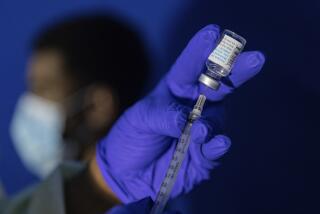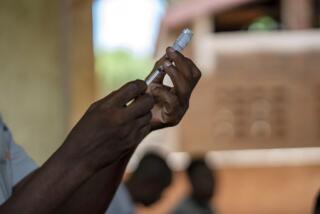Experts at Malaria Conference Say Progress Is Tempered by Setbacks
- Share via
JOHANNESBURG, South Africa — Each breakthrough in the fight against malaria, the biggest killer of African children, seems matched by a setback, with researchers at a major malaria conference in Cameroon this week reporting encouraging news on a new vaccine, even as resistance to drugs that once offered cheap protection is rising sharply.
Counterfeit drugs and patients’ failure to complete the full malaria medical treatment have led to malaria medications becoming ineffective, said Wilfred Mbacham, associate professor of public health and biotechnology at the University of Yaounde in Cameroon, in a phone interview.
Researchers at the conference also warned that mosquitoes that carry the parasite causing malaria were becoming increasingly resistant to insecticides, which could undermine a common means of fighting malaria.
The use of insecticide-treated bed nets, seen as one of the most effective ways to combat malaria in Africa, has risen in recent years, according to other research reported at the conference, which ends today.
Malaria takes the life of a child in sub-Saharan Africa every 30 seconds, according to the World Health Organization, which estimates that 1 million people worldwide die of malaria each year, 90% of them in sub-Saharan Africa. Most victims are children and pregnant women.
In 1998, the World Health Organization, the World Bank, UNICEF and others set up the Roll Back Malaria partnership, uniting 90 organizations and countries in an effort to halve malaria cases by 2010. Instead, cases have continued to increase.
In April, the journal Lancet published an article estimating that 500 million people are sickened by malaria each year, 50% higher than WHO estimates, adding that it was clear that the international campaign had “failed in its aims.”
One of the most encouraging developments reported at this week’s conference was that RTS,S/ASOZA, a vaccine tested on more than 2,000 children in Mozambique, prevented 49% of expected severe malaria cases in children, offering protection for up to 18 months. Initial news of the vaccine emerged in 2003, when it was shown to offer six months of protection.
Another optimistic development reported at the conference was successful trials of Intermittent Preventive Treatment for Infants, or IPTi, in four African countries, a treatment in which antimalarial medication is given to babies three times in their first year of life, piggybacking on the normal vaccinations babies get through health centers.
“We’re using a well-established mechanism that’s already there for targeting these children,” said Andrea Egan, co-coordinator of the IPTi Consortium, speaking from Barcelona, Spain. The consortium is funded by a $28-million grant from the Bill & Melinda Gates Foundation.
The problem is that if the treatment only lasts a year, infants may be equally vulnerable to malaria after the treatment ends.
Egan said that for older children, mass administration of drugs would be difficult and more costly because there is no established method of distribution. But she said that after a further trial involving 200,000 infants in six countries, the consortium might recommend to the World Health Organization next year that the treatment be implemented across Africa.
Mbacham said the keys to combating resistance to malaria drugs were educating people on how to take malaria medication and improving the quality of drugs available.
“Some people begin to take antimalarial medications and once they feel better the tendency is to set aside the remaining tablets for another member of the family who may fall ill,” he said. “So they really never complete the dosage that they have been prescribed. That means not all the parasites are eliminated, some of which may become resistant, and then they get propagated.”
In many African villages, he said, people were not even aware that mosquitoes caused malaria.
“The emphasis must be laid on education,” he said. “People are just not aware of what to do, and so they cannot do it because they just don’t know. Most of the villagers don’t see the mosquito as causing malaria until we explain that and get that through.”
Counterfeit drugs, with low amounts of the required active ingredient, are common in African street markets and also help create resistance to antimalarial medication.
“You often find them on the streets, and they are fake because they mimic the trademarks and logos of other well-known companies and drugs,” he said, adding that cheaper medications were often all the poor could afford. “If people are sick and cannot find the right medications, they’ll go for whatever they see.”
Drugs containing artemisinin, an antimalarial substance derived from the wormwood plant, are more effective, but Mbacham said they cost 20 to 40 times more than commonly used drugs like sulfadoxine-pyrimethamine and amodiaquine. The malaria parasite has become increasingly resistant to the latter drugs.
In 2000, African leaders meeting in Nigeria set a target of getting 60% of children and other vulnerable people to sleep year-round under bed nets by 2005, but that target is still far from being met. One Ugandan study found that 60% of treated bed nets handed out free to displaced women in Uganda were not used.
Some researchers reported that ignorance of the mosquito-malaria link was a problem in the use of bed nets. In some countries, people associated the color of nets with death shrouds. In Uganda, the nets were used to make wedding dresses. For some, the discomfort of sleeping under a net in the heat discouraged its use.
Martin Alilio, research director for NetMark, a public-private partnership working to increase the use of treated bed nets, said they were used in 50% of Zambian households in 2004 compared with 25% in 2000. In Nigeria, Africa’s most populous country, the figure rose to 27% from 12% during the same period.
More to Read
Sign up for Essential California
The most important California stories and recommendations in your inbox every morning.
You may occasionally receive promotional content from the Los Angeles Times.













